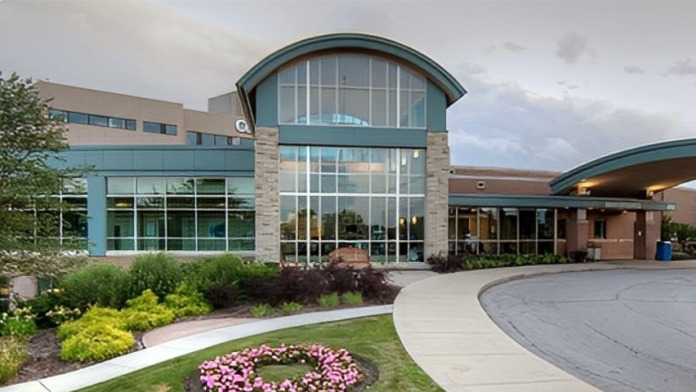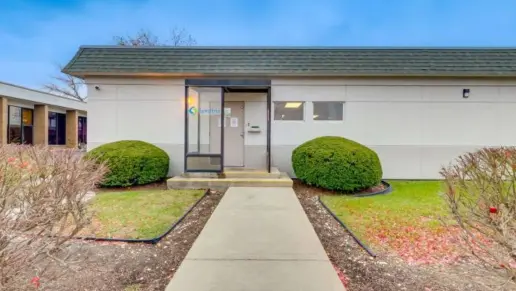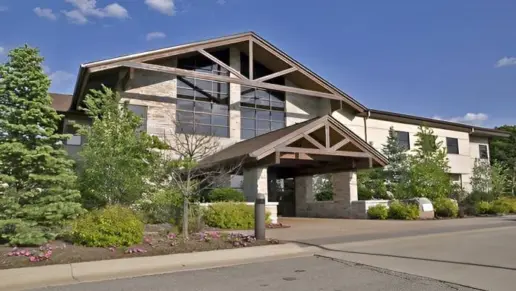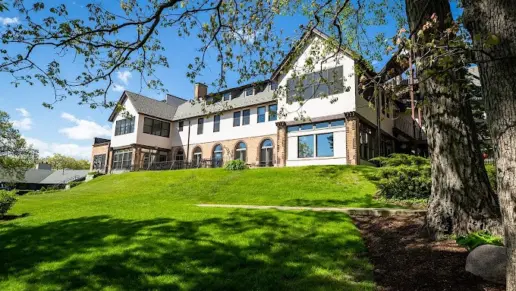The nurses have no compassion here. Don't even consider about going here, just go elsewhere. They also lack communication skills, and they could use some training on how to attend people politely and adequately.
About Centegra Hospital
Specialty rehab programs at Centegra Hospital include tailored care focusing on women's specific needs and experiences, gender-specific addiction treatment addressing unique challenges faced by men, and age-sensitive addiction treatment considering health and life-stage issues of older adults.
Patients at Centegra Hospital will find the residential setting creates an immersive environment promoting full engagement in recovery away from daily triggers and the WiFi lets you stay connected with support networks and manage personal affairs during treatment. For recreation, patients can use the yoga studio to work on active mindfulness and improve flexibility, unwind in the rec room after a lengthy day of therapy, or use the meditation room to promote mindfulness during recovery.
Centegra Hospital has received accreditations from The Joint Commission.
Latest Reviews
Rehab Score
Gallery

Location
Other Forms of Payment
Private insurance refers to any kind of healthcare coverage that isn't from the state or federal government. This includes individual and family plans offered by an employer or purchased from the Insurance Marketplace. Every plan will have different requirements and out of pocket costs so be sure to get the full details before you start treatment.
Self-pay involves paying for treatment out of your own pocket. You can use savings or credit, get a personal loan, or receive help from family and friends to fund your treatment. If you don't have insurance or your insurance plan doesn't cover a specific program, self-pay can help ensure you still get the care you need.
Medicare is a federal program that provides health insurance for those 65 and older. It also serves people under 65 with chronic and disabling health challenges. To use Medicare for addiction treatment you need to find a program that accepts Medicare and is in network with your plan. Out of pocket costs and preauthorization requirements vary, so always check with your provider.
Military members, veterans, and eligible dependents have access to specific insurance programs that help them get the care they need. TRICARE and VA insurance can help you access low cost or no cost addiction and mental health treatment. Programs that accept military insurance often have targeted treatment focused on the unique challenges military members, veterans, and their families face.
Financial aid can take many forms. Centers may have grants or scholarships available to clients who meet eligibility requirements. Programs that receive SAMHSA grants may have financial aid available for those who need treatment as well. Grants and scholarships can help you pai for treatment without having to repay.
Medicaid is a state based program that helps lower-income individuals and families pay for healthcare. Medicaid covers addiction treatment so those enrolled can use their coverage to pay for rehab. When a program accepts Medicaid the client often pays very little or nothing out of their own pocket.
Addiction Treatments
Levels of Care
Treatments
The goal of treatment for alcoholism is abstinence. Those with poor social support, poor motivation, or psychiatric disorders tend to relapse within a few years of treatment. For these people, success is measured by longer periods of abstinence, reduced use of alcohol, better health, and improved social functioning. Recovery and Maintenance are usually based on 12 step programs and AA meetings.
Drug rehab in Illinois is designed to help people recover from addiction to a number of substances. The length of each program and its intensity tend to vary, and the plan of care is based on your individual needs.
The term co-occurring is used to indicate a person has both a mental health condition and struggles with substance use. The co-occurring disorders program helps people to see how their substance use and their mental health symptoms are related. The program addresses ways to manage both conditions at the same time. Participation in this treatment track is based on the patient's needs and is a decision made between each patient and the treatment staff.
A combined mental health and substance abuse rehab has the staff and resources available to handle individuals with both mental health and substance abuse issues. It can be challenging to determine where a specific symptom stems from (a mental health issue or an issue related to substance abuse), so mental health and substance abuse professionals are helpful in detangling symptoms and keeping treatment on track.
Opioid rehabs specialize in supporting those recovering from opioid addiction. They treat those suffering from addiction to illegal opioids like heroin, as well as prescription drugs like oxycodone. These centers typically combine both physical as well as mental and emotional support to help stop addiction. Physical support often includes medical detox and subsequent medical support (including medication), and mental support includes in-depth therapy to address the underlying causes of addiction.
Programs


Clinical Services
Tipper has been visiting patients for several years at Centegra Health System. She is not your typical volunteer, though. Tipper is a dachshund/sheltie mix owned by Nanci Tayler and she is one of more than 30 dogs participating in Centegra’s Animal Assisted Therapy Program called Caring Paws. Studies have shown that visits from a therapy dog reduce blood pressure, feelings of anxiety, stress levels and loneliness, all of which aids in the healing process. At Centegra, therapy dogs visit patients in the waiting areas, at Centegra Sage Cancer Center as well as in the nursing units.
Cognitive Behavioral Therapy (CBT) is a therapy modality that focuses on the relationship between one's thoughts, feelings, and behaviors. It is used to establish and allow for healthy responses to thoughts and feelings (instead of unhealthy responses, like using drugs or alcohol). CBT has been proven effective for recovering addicts of all kinds, and is used to strengthen a patient's own self-awareness and ability to self-regulate. CBT allows individuals to monitor their own emotional state, become more adept at communicating with others, and manage stress without needing to engage in substance abuse.
Whether a marriage or other committed relationship, an intimate partnership is one of the most important aspects of a person's life. Drug and alcohol addiction affects both members of a couple in deep and meaningful ways, as does rehab and recovery. Couples therapy and other couples-focused treatment programs are significant parts of exploring triggers of addiction, as well as learning how to build healthy patterns to support ongoing sobriety.
Creativity is inherently healing, and can help those in recovery express thoughts or feelings they might not otherwise be able to. Creative arts therapy can include music, poetry/writing, painting, sculpting, dance, theater, sandplay, and more. Unlike traditional art, the final product matters far less than the experience of creation and expression itself.
Experiential therapy is a form of therapy in which clients are encouraged to surface and work through subconscious issues by engaging in real-time experiences. Experiential therapy departs from traditional talk therapy by involving the body, and having clients engage in activities, movements, and physical and emotional expression. This can involve role-play or using props (which can include other people). Experiential therapy can help people process trauma, memories, and emotion quickly, deeply, and in a lasting fashion, leading to substantial and impactful healing.
Research clearly demonstrates that recovery is far more successful and sustainable when loved ones like family members participate in rehab and substance abuse treatment. Genetic factors may be at play when it comes to drug and alcohol addiction, as well as mental health issues. Family dynamics often play a critical role in addiction triggers, and if properly educated, family members can be a strong source of support when it comes to rehabilitation. Family involvement is encouraged and family therapy sessions are offered to all program participants. They recommend that patients share their experience in the program with their family so they can understand what patients are working on and reinforce their changes.
Group therapy is the basis of the IOP and PHP programs. People often find the group-based treatment approach is helpful in assuring them they are not alone in their thoughts, feelings and circumstances. The professional staff provides education and guidance while the group itself provides useful feedback and support. Group size depends on how many people are enrolled in the program on any given day. Typically, groups are 6-12 people. There are open discussion groups called process groups where patients ask for and receive feedback from other group members on current struggles. Some groups are more educational in nature and are geared to teaching specific skills to manage symptoms. These groups may focus on topics such as anger management, coping strategies, enhancing self-compassion, cognitive behavioral therapy skills or relapse prevention skills. Other group sessions are experiential where the learning comes from doing. Art therapy and yoga are some examples of experiential groups.
In individual therapy, a patient meets one-on-one with a trained psychologist or counselor. Therapy is a pivotal part of effective substance abuse treatment, as it often covers root causes of addiction, including challenges faced by the patient in their social, family, and work/school life.
Nutrition therapy, aka medical nutrition therapy (MNT), is a way of treating physical, emotional, and medical conditions through diet. Specific dietary plans are designed by professional nutritionists or registered dietitians, and patients follow them in order to positively affect their physical and mental health.
Amenities
-
Residential Setting
-
Private Setting
-
Yoga Studio
-
Wifi
-
Private Rooms
Accreditations

The Joint Commission, formerly known as JCAHO, is a nonprofit organization that accredits rehab organizations and programs. Founded in 1951, the Joint Commision's mission is to improve the quality of patient care and demonstrating the quality of patient care.
Joint Commission Accreditation: Yes
Contact Information
3701 Doty Road
Woodstock, IL 60098


